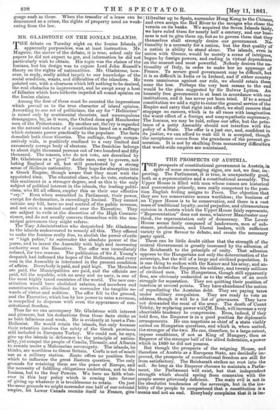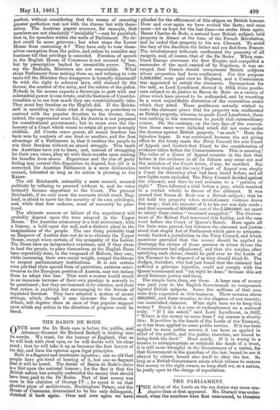THE PROSPECTS OF AUSTRIA. T HE prospects of constitutional government in
Austria, in spite of some encouraging signs, are not, we fear, im proving. The Parliament, it is true, is unexpectedly good, both as a representative and a constitutional assembly. The Upper House is filled with men whose names are historical and possessions princely, men really competent to the posi- tion English feeling assigns to Peers. The objection that they are too conservative seems worthless ; the business of an Upper House is to be conservative, and there is a vast mass of traditional loyalty, social prejudice, and ultramontane opinion in Austria which the Upper House fairly represents, "Representation" does not mean, whatever Manchester may think, the representation only of democracy. The Lower House seems fairly composed of landowners, men of sub- stance, professionals, and liberal leaders, with sufficient variety to give flavour to debate, and create the necessary party spirit. There can be little doubt either that the strength of the central Government is greatly increased by the adhesion of the Reichsrath to the principle of unity. That adhesion opposes to the Hungarians not only the determination of the sovereign, but the will of a large and civilized population. It is one thing to reckon with the Kaiser and his army, and an- other to defeat the Emperor, his soldiery, and twenty millions of civilized men. The Hungarians, though still apparently firm, are obviously undecided as to the wisdom of an overt struggle for separation. They are quitting their position of inaction at several points. They have abandoned the notion of repudiating the Austrian debt. They are paying taxes under military compulsion. They are ready to vote an address, though it will be a list of grievances. They have not demanded the recal of the army. The death of Count Teleky, by replacing power with:M. Desk, will increase a very observable tendency to compromise. Even, indeed, if they hold firm, the Emperor is in a good position for diplomatic arrangements. He can negotiate as chief of a state visibly united on Hungarian questions, and which is, when united, the stronger of the two. He can, therefore, to a large extent, impose conditions, if not as King of kungary, then as Emperor of the stronger half of the allied federation, a power which in 1860 he did not possess. But though the prospects of the reigning House, and therefore of Austria as a European State, are decidedly im- proved, the prospects of constitutional freedom are still far from satisfactory. The Reichsrath strikes no root into the soil. So long as the Emperor chooses to maintain a Parlia- ment, the Parliament will exist, but that independent strength which should spring from connexion with the people seems grievously deficient. The main evil is not in the absolutist tendencies of the sovereign, but in the ina- bility of the people to comprehend that a constitution is a means and not an end. Everybody complains that it is im- perfect, without considering that the means of ensuring greater perfection rest not with the throne but with them- selves. The Austrian papers murmur, for example, that members are not absolutely "inviolable"—may be punished, that is, for speeches within the walls of Parliament. No de- fect could be more grievous ; but what stops the Lower House from correcting it ? They have only to vote them- selves exemption from the police, and refuse to consider any business till that privilege is conceded. Freedom of speech in the English House of Commons is not secured by law, but by prescription backed by irresistible power. Then, say the Radicals, Ministers are not responsible. What stops Parliament from making them so, and refusing to vote taxes till the Minister they disapprove is formally dismissed? So with the right to octroyer laws, still claimed by the throne, the control of the army, and the reform of the police. Nobody in his senses expects a Sovereign to part with any substantial power he can retain, and the business of Constitu- tionalists is to see how much they can constitutionally take. They must buy freedom as the English did. If the Reichs- rath is unwilling to claim what it requires, or powerless to contend with the popular devotion to the throne, then, indeed, the experiment must fail, for Austria is not prepared for constitutional government ; but to moan over the dis- honesty of a Court which wants to retain all power is simply childish. All Courts crave power, all sound freedom has been won by contests of one kind or another, and the first advantage of a Parliament is, that it enables the people to win their freedom without an armed struggle. This truth the Austrians have yet to learn, and, instead of struggling for their own views, they sit with their mouths open waiting for benefits from above. Experience and the rise of party feeling may correct this disposition to depend, but, till it is corrected, the Austrian Parliament is a mere deliberative council, tolerated as long as its action is pleasing to the Kaiser.
The old Reichsrath, ostensibly a mere council, secured publicity by refusing to proceed without it, and its votes instantly became important to the Court. The present Reichsrath, if we only trust the accounts which reach Eng- land, is afraid to move for the security of its own privileges, and, while that fear endures, must of necessity be para- lyzed. The ultimate success or failure of the experiment will probably depend upon the tone adopted in the Upper House. The Austrian aristocracy is a real aristocracy, with a history, a hold upon the soil, and a distinct place in the imaginations of the people. The one thing probably that an Emperor of Austria dare not do is to alienate the Upper House, except when certain of the sympathy of the Lower. The Peers have an independent existence, and if they chose to lead the people, to place themselves, as the English Peers have repeatedly done, in the vanguard of Reform, they may, while increasing their own social weight, compel the throne to respect parliamentary institutions. It is not certain even yet that their special form of patriotism, extreme sensi- tiveness to the European position of Austria, may not induce them to adopt this line. That such a course would result in an immense increase of their own prestige is scarcely to be questioned ; but they are hemmed in by coteries, and their first action is anything but encouraging to the friends of regulated freedom. They have adopted a system of secret sittings, which, though it may increase the freedom of debate, will deprive them at once of that popular support upon which any action in the direction of progress must be based.































 Previous page
Previous page